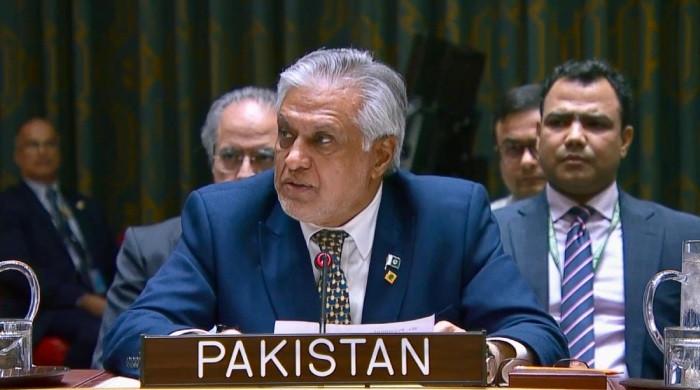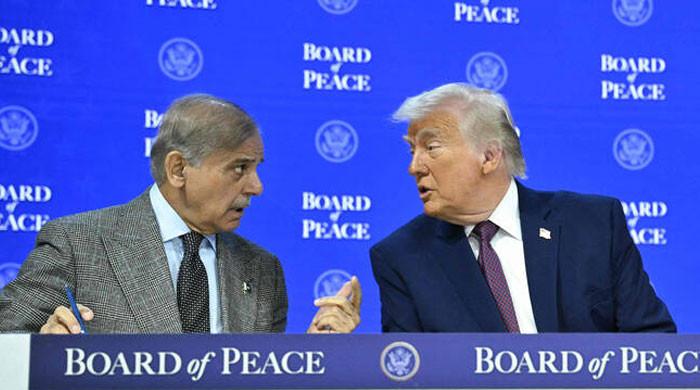Justice Najafi links Noor Mukadam case to 'rising live-in relationships'
FCC judge issues his additional note alongside apex court’s judgment dismissing accused Zahir Jaffer’s plea
November 27, 2025

- State must play more active role in educating youth: Justice Najafi
- Judge says murder case result of vice spreading in upper society.
- Incident should serve as wake-up call for society: FCC judge
ISLAMABAD: Justice Ali Baqar Najafi has urged Pakistan’s youth to recognise the “horrible consequences” revealed by the Noor Mukadam murder case, calling it a tragedy that should prompt social reformers to address rising societal vices.
In an additional note to the Supreme Court’s judgment dismissing the appeal of accused Zahir Jaffer, Justice Najafi, who is now part of the Federal Constitutional Court, linked the case to the increasing trend of unmarried cohabitation, describing it as a vice gaining traction among upper-class circles, The News reported on Thursday.
Justice Najafi, who served on the three-member bench that heard the case in May, stressed that the incident should serve as a wake-up call for society to reflect on moral and social responsibilities and the need for preventive measures.
Jaffer had been convicted by an Islamabad trial court in 2022 and handed the death sentence, which the Supreme Court upheld. On May 20 this year, the bench headed by Justice Muhammad Hashim Khan Kakar had rejected Jaffer’s appeal. The court upheld his death sentence for murder but converted the death penalty awarded under rape charges into life imprisonment.
In his note, Justice Najafi wrote that the state must play a more active role in educating young people about cohabitation, drug abuse and related social risks.
“I had the privilege of going through the majority view, to which I agree in toto; however, the following is the additional note of the judgement signed by me on May 20, 2025”, Justice Najafi wrote in his seven-page note.
The judge observed that the case was, in his view, “a direct result of a vice spreading in upper society” — what he termed a ‘living relationship’ (unmarried cohabitation) — which he said defied both state law and Islamic injunctions, amounting to “a direct revolt against Almighty Allah”.
“The young generation must note its horrible consequences such as in the present case”, he added, calling the issue one for social reformers to confront. He urged that such matters be openly discussed rather than ignored within privileged social circles.
Justice Najafi further noted that there were no mitigating circumstances and that minor discrepancies — including the timing of the incident, delays in the postmortem or the absence of fingerprints on the knife despite a DNA match — did not shake the prosecution’s case, which had proved Jaffer’s guilt beyond a reasonable doubt.
He emphasised that the brief delays in the FIR and autopsy and the small gaps in the CCTV timeline could not override the “consistent chain” of circumstantial evidence.
The judge also rejected the defence theory that Noor had consumed drugs or that Jaffer was mentally unsound, noting that no medical or factual evidence supported such claims.
In examining the circumstantial evidence, the judge wrote that “one end of the rope is found tied with the dead body of Noor Mukadam and the other end tied with the neck of the petitioner”.
The case
Noor, 27, was found dead at a private residence in Sector F-7/4, Islamabad, in July 2021. Zahir Jaffer, the primary suspect, was taken into custody at the crime scene and an FIR was filed by the victim’s father later the same day.
According to the original FIR, Noor’s father reported that she had been “beheaded after being killed with a sharp weapon” in a gruesome act that shocked the nation.
In February 2022, a district and sessions court sentenced Jaffer to death, alongside a 25-year prison term with hard labour and a fine of Rs200,000, concluding the trial that continued for over four months.
Besides the prime accused, two members of his domestic staff, Iftikhar and Jameel, were each handed 10-year prison sentences, while other co-accused — including Jaffer’s parents and several TherapyWorks employees — were acquitted.
In March 2023, the Islamabad High Court upheld Jaffer’s death sentence and upgraded his 25-year sentence to an additional death penalty, on the appeals filed against the punishment awarded to the convicts.
An appeal challenging the IHC verdict was subsequently filed in the Supreme Court in April last year.
In May 2025, the SC upheld the death sentence of Zahir for the murder of Noor.











